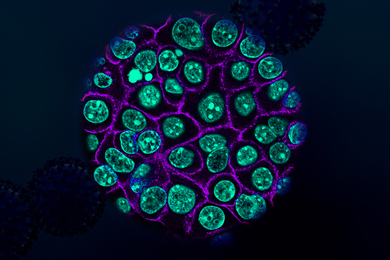Seth Mnookin, an assistant professor of science writing and associate director of MIT's Graduate Program in Science Writing, is the author of "The Panic Virus: The True Story Behind the Vaccine-Autism Controversy" (Simon and Schuster, 2011), an acclaimed book that examines how inaccurate scientific reports linking vaccines to autism have reverberated through the media. The book won the the National Association of Science Writers' Science in Society Award in 2012. Mnookin spoke on the significance of the recent and ongoing measles outbreak in the U.S., and the current status of vaccination acceptance.
Why are measles and the measles vaccine getting so much attention in the media at the moment?
Mainly because of a measles outbreak that began late in December in Disneyland and has now spread across the country. As of Feb. 20, there have been 154 measles case reported in 2015; between 117 and 133 of those have been tied directly to the Disneyland outbreak. That's an alarming number, especially considering that in 2000, the World Health Organization declared measles eliminated in the U.S., and that from 2000 through 2010, we didn't have more than 150 cases in any single year. Unfortunately, we passed that threshold in three of the past four years — and in 2014, had more than 600 infections in the country as a whole.
While this is obviously a big jump, it's true that in a country of more than 300 million, a few hundred cases represents a tiny percent of the population. The reason there is so much concern is because measles is the most infectious microbe known to humankind, and it's extraordinarily difficult to contain outbreaks. One study of a 2008 measles outbreak in San Diego found that containing each individual case ends up costing more than $10,000. And we only need to look to Western Europe to see how quickly a measles epidemic can spin out of control: In less than five years, France went from having less than 100 cases a year to having more than 10,000 cases — and some deaths.
Why is it that some people aren't vaccinating?
There is no simple answer to this. The origin of a lot of anxiety about the measles-mumps-rubella (MMR) vaccine is a 1998 study by a disgraced British gastroenterologist named Andrew Wakefield. That study, published in The Lancet, claimed a potential link between the MMR vaccine and a gut disorder and then hypothesized a further link between that gut disorder and autism. Since then, it's been revealed that Wakefield had taken out a patent on an alternative measles vaccine right before his paper came out; that Wakefield was receiving money from a lawyer working with parents to sue vaccine manufacturers; and that several of the 12 children in his study had been funneled to him by that lawyer. These are some of the reasons the paper has since been retracted and declared an elaborate fraud, and they also contributed to Wakefield losing his medical license.
Unfortunately, one thing we've learned is that it's far easier to scare people than it is to reassure them, and once a specific fear has been raised it will take on a life of its own — almost like a virus.
Another factor here is that vaccines are a victim of their own success: Parents of my generation are unlikely to have ever seen a child in an iron lung because of polio. They're unlikely to know families who waited anxiously while their measles-infected infant was in the [neonatal intensive care unit], or children who were blinded by rubella or made sterile by mumps. As a result, the diseases that vaccines protect us against have come to seem almost notional. Contrast that with the amount of attention that so-called controversies over vaccine safety have received, and it's not hard to see why this has become a difficult issue.
I do think it's important to stress, though, that even in this current climate, well more than 90 percent of parents vaccinate. It's really a tiny percentage of parents who are deliberately choosing not to vaccinate. Unfortunately, these measles outbreaks are illustrating how even a small number of unvaccinated children can have a serious impact on public health.
If I've been vaccinated, and my children have all been vaccinated, is there any reason I need to be concerned about any of this?
If you're talking specifically about measles, then the answer is for the most part, no. The measles vaccine is one of the most effective vaccines we have. A single dose of the MMR provides immunity in around 95 percent of people, and a second dose — which is what is currently recommended — gives immunity to virtually everyone else. However, it's important to remember that infants don't receive their first MMR shot until they're a year old, which means children are vulnerable during the precise period in which measles is most likely to cause serious, and potentially life-threatening, complications.
One other thing that's worth mentioning is that even if you and your family are fully vaccinated, there are going to be people in your community who are at risk: In addition to infants, people with compromised immune systems and the elderly are oftentimes vulnerable. This really is a situation where not vaccinating not only puts one's own children at risk, it puts people around them at risk as well.
What do you see as the ideal situation for vaccination and public health, and what efforts do you think will be involved in getting closer to that condition?
An ideal situation would be that we have over 95 percent vaccine uptake for all of the recommended childhood vaccines; at that level, herd immunity kicks into effect. [Herd immunity is when enough people in a population are immune so that even if there's is a small number of infections, there's no way for that infection to spread.]
In terms of efforts needed to get to that point, that's a difficult question. I recently wrote a piece for The New Yorker on the need to do more research into effective vaccine communication. At the moment, we simply don't know enough to know what strategies would be most likely to reach that small number of parents who are ignoring the scientific evidence.
__________________________________________
Interview prepared by SHASS Communications
Editorial and Design Director: Emily Hiestand









